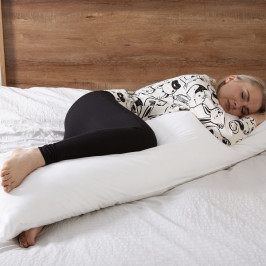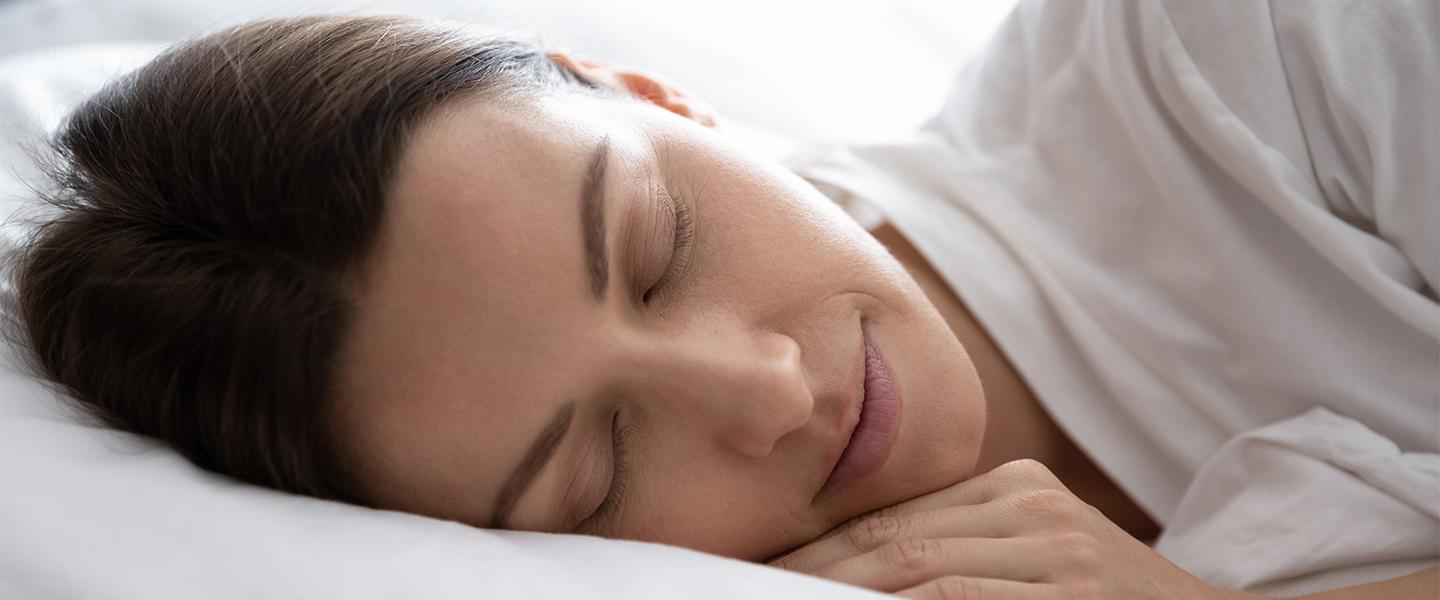Why Sleep is Important for Good Health and Wellbeing
Getting a good night’s sleep is incredibly important for your health. In fact, it’s just as important as eating a nutritious diet and exercising. Though exact sleep needs vary from person to person, most adults require between 7 and 9 hours of sleep per night.
Yet, the NHS suggests that 1 in 3 of us suffers from poor sleep, and that experiencing poor sleep on a regular basis can put you at risk of serious medical conditions, including obesity, heart disease, high blood pressure and diabetes. Sleep deprivation not only puts your health and safety at risk, but it can ultimately shorten your life expectancy, which is why it’s essential that you prioritise a good night’s sleep on a daily basis.
If you’re not sure whether you’re getting enough sleep or not, think about how well you function during the day. As a general rule, if you wake up tired and spend the day feeling like you want to take a nap, it’s likely that you’re not getting enough quality sleep. There can be certain health conditions that cause poor sleep, such as sleep apnoea, but in most cases, it’s due to bad sleeping habits.
Read our Tips to Improve Sleep blog if you think you could benefit from practising better habits when it comes to setting yourself up for a good night’s sleep.
What happens when we don’t sleep well?
An occasional night where we don’t get a restful night’s sleep can leave us feeling fatigued, short-tempered, and lacking focus. However, this won’t harm your overall health or have any lasting implications if it only happens every now and again.
If you start to experience a string of sleepless nights, the effects can become more serious and lead to potential health and safety risks. For example, after several nights of low-quality sleep, your brain can start to fog, making it difficult to concentrate and make decisions.
You might also notice the effects on your mental health; starting to feel down and less sociable than usual whilst wanting to sleep during the day. There’s an increased risk of accidents and injury, too: the chances of you having an accident at home, work and on the road are heightened when you’re suffering from fatigue.
So now you know what can happen if you don’t get enough sleep, read on to find out about all the wonderful benefits of a good night’s sleep that make it so important for your health and wellbeing.
Benefits of a good night's sleep
Supports a healthy immune system
You may not realise it but getting enough sleep every night (7-9 hours ideally) can improve your body’s antibody responses to illness and infection. Notice how you want to sleep more when you’re not feeling well? That’s because sleep helps the body to repair, regenerate and recover, and your body knows that getting some extra shut-eye is the best way for you to get over whatever illness it’s trying to fight off.
Boosts mental wellbeing
Just as important as our physical health, is our mental health. When we consider that an isolated sleepless night can leave us feeling irritable and moody the next day, it’s not surprising that a build-up of poor-quality sleep can lead to long-term mood disorders such as clinical depression and generalised anxiety disorders in adults.
Furthermore, a study conducted by the NHS found that when patients with anxiety or depression were asked to calculate their sleeping habits, most of them slept for an average of less than 6 hours a night. Those who are chronically sleep-deprived are also more likely to withdraw from social events and experience loneliness, so prioritising our sleep is a key way to improve our relationship with others, too.
Helps maintain a healthy weight
The effect sleep has on weight is believed to be influenced by multiple factors, including hormone regulation and having the motivation to eat well and exercise. Sleep deprivation increases levels of the hormone ghrelin, which makes us feel hungry, whilst it also decreases levels of leptin, which makes us feel full. As a result of these hormonal imbalances, we can feel hungrier and overeat.
This fact has been supported by numerous studies which have found that sleep-deprived individuals tend to eat more calories and to compensate for the lack of energy we have when feeling tired, we also tend to crave foods that have a higher calorie content and therefore higher in sugar and fat. With all this in mind, it’s quite easy to see how a lack of sleep could hinder your efforts to maintain a healthy weight.
Improves concentration and productivity
Sleep is important for brain function, and getting the right amount can boost cognition, concentration and productivity. Studies have also shown this isn’t just limited to adults, either. Getting enough sleep can improve academic performance in children and adolescents.
A good sleep has also been shown to improve problem-solving skills and enhance memory performance, as without enough sleep, your brain doesn’t have time to properly store memories so you can refer back to them later.
Keeps your heart healthy
When you sleep, your blood pressure naturally lowers, giving your heart and blood vessels a bit of a rest. Getting less than the recommended 7 to 9 hours of sleep means your blood pressure and heart rate stay up more during a 24-hour cycle, and persistent high blood pressure can lead to heart disease.
It’s worth noting that this works the other way too: excessive sleep – so regularly getting more than 9 hours – can also have an adverse effect on our heart health, as this can also lead to an increased risk of high blood pressure and heart disease.
Prevents risk of diabetes
There is a strong link between chronic sleep deprivation and the risk of developing diabetes. When we sleep, our bodies are able to concentrate on performing the processes it needs to maintain our optimal health. Getting a reduced amount of sleep alters the way our body uses the hormone insulin to process glucose, which we use for energy.
When we enter into a deep sleep cycle, the amount of glucose in our blood drops, allowing our bodies to maintain healthy levels of insulin. Shorter, less restful sleep can cause physiological changes like decreased insulin sensitivity which increases the risk of developing diabetes.
Catch up on lost sleep to reap the rewards
As we’ve seen, getting a good amount of quality sleep can lead to multiple benefits on your overall health and wellbeing. And whilst you can’t erase the sleep debt you might have already built up from a history of poor sleep, the good news is that there are steps you can take to ensure you’re soon reaping the rewards of a solid 7 to 9 hours of shut eye on a regular basis.
Start on a weekend (or when you have a bit more time) and try to add an extra hour on to the time you’re in bed to start with. Rather than sitting in front of the TV until late into the night, take cues from your body and go to bed when you’re tired if you are able to.
If you can, also try not to set an alarm for waking up. Allow your body to wake up naturally – you might find that if you’ve been lacking in sleep, you sleep for more like 10 hours a night to start with. This is fine and normal, and your body will naturally learn to adapt and regulate to a normal level.
Also try not to rely on caffeine or naps as a short-term way to boost your energy when you’re tired. If you’re struggling to get enough good quality sleep on a night then relying on quick fixes won’t solve the problem in the long run and might even cause more disruption to your sleep patterns. Take a look at our Tips to Improve Sleep blog for ideas on how you can address any bad sleep habits and take steps towards improving your sleep for better health and wellbeing all-round.
At Sleepseeker, we know the value of a good night’s sleep, which is why we offer a range of products to suit everyone’s individual needs, including duvets, pillows and mattress toppers.
We even have a wellbeing range, to provide targeted help for specific physical and mental issues you may be experiencing. We also have a guide on how to make a lavender pillow spray to improve your sleep environment.
Please feel free to contact our friendly team if you’d like any help or advice with how you can achieve a better sleep: we’d be happy to help.
What's trending now...
-

Slumberdown Super Support Firm Support Side Sleeper Pillow, 2 Pack
£17.00
Shop Now -

Slumberdown All Seasons Combi 15 Tog (10.5 + 4.5 Tog) Double Duvet
£30.50
Shop Now -

Slumberdown Paws for Slumber Navy Pet Bed, Large
£49.00
Shop Now -

Slumberdown Wonderful Wool Mattress Topper, King
£60.00
Shop Now -

Slumberdown Paws for Slumber Extra Large Pet Bed Spare Cover, Grey
£20.00
Shop Now -

Slumberdown Anti Allergy Pillow Protector - Pack of 2
£15.50
Shop Now -

Slumberdown Anti Allergy Mattress Protector - Double
£20.50
Shop Now -

Slumberdown Wonderfully Warm Electric Blanket - Single
£60.00
Shop Now -

Slumberdown Paws For Slumber Sherpa Pet Bed, Medium
From: £25.00
Shop Now -

Slumberdown Super Support Firm Support Side Sleeper Pillow
From: £17.00
Shop Now -

Slumberdown All Seasons Combi Duvet
From: £25.50
Shop Now -

Slumberdown Paws for Slumber Large Pet Bed
From: £49.00
Shop Now -

Slumberdown Wonderful Wool Mattress Topper
From: £54.50
Shop Now -

Slumberdown Paws for Slumber Extra Large Pet Bed Spare Cover
From: £20.00
Shop Now -

Slumberdown Anti Allergy Pillow Protector
From: £15.50
Shop Now -

Snuggledown Scandinavian Hollowfibre Mattress Protector - Single
£14.00
Shop Now -

Slumberdown Wonderfully Warm Electric Blanket
From: £60.00
Shop Now -

Slumberdown Body Support Pillow, 1 Pack, Includes 100% Cotton Pillow Case
£20.00
Shop Now -

Slumberdown All Seasons Combi 15 Tog (10.5 + 4.5 Tog) King Size Duvet
£34.00
Shop Now -

Slumberdown Paws for Slumber Olive Green Pet Bed, Large
£49.00
Shop Now -

Slumberdown Wonderful Wool Mattress Topper, Double
£54.50
Shop Now




